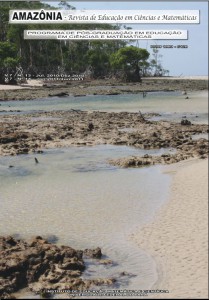An approach critical in mathematics education: Opportunities and interaction theory-practice-through critical mathematics education
DOI:
https://doi.org/10.18542/amazrecm.v7i0.1697Keywords:
critical mathematics education, teacher training, curriculumAbstract
This paper discusses the possibilities of articulation of theory-and-practice in the teaching, by means of critical mathematics education as a proposal for the teacher facing the challenges of daily life in the classroom. The discussion is based on the literature through which was estudied and analyzed several books, articles and dissertations on the subject, as well as our experiences and reflections resulting from the process of teacher education we experienced. From the readings and analysis was possible to construct a teaching proposal that suggests to address critical mathematics education as an alternative link between theory and practice and to assign to the teaching of mathematics a greater dynamism, with the prospect of developing knowledge and pedagogical practices that contribute to a broader training, which prepares for citizenship and for being critical students and teachers in the training process. Conjectures were raised about possible contributions of critical mathematics education as a differentiated alternative as opposed to reproductivist teaching. We believe therefore that this article could help with the reflections on the importance of mathematics education in teacher education which enables the realization that beyond disciplinary knowledge (content), are necessary pedagogical knowledge, curriculum and experiential to address the problems that relate to the teaching of mathematicsReferences
ALARCÃO, Isabel. Professores reflexivos em uma escola reflexiva. São Paulo: Cortez, 2010.
ARAGÃO, Rosália M. R. de. Questões de Autonomia e de Competência: Relações de qualidade educativa do trabalho docente. Anais do XXI Simpósio Brasileiro de Administração da Educação. III Congresso Luso-Brasileiro de Política e Administração da Educação, ANPAE, Recife, Nov.2003.
ASSUDE, Tereza. Elementos de reflexão sobre a análise e o desenvolvimento curricular. Versailles: IREM, 1998.
BARBOSA, J. C. Modelagem na educação matemática: uma perspectiva: In: Encontro Paranaense de Modelagem em Educação Matemática. 1, 2004b, Londrina, Anais, Londrina. UEL, 2004 1 CD-ROM.
BONDÍA, J. L. Notas sobre a experiência e o saber de experiência. Revista Brasileira de Educação. Jan-abr número 19. São Paulo, p. 21-28, 2002.
CHARLOT, B. Relação com o saber, formação de professores e globalização: questões para educação hoje. Porto Alegre: Artmed, 2005.
CLANDININ, J.S. Classroom practice: teacher Images in action. London: Falmer Press, 1986.
CONTRERAS, José. A autonomia de professores. São Paulo: Cortez, 2002.
FIORENTINI, D.; LORENZATO, S. Investigação em educação matemática: percursos teóricos e metodológicos. Autores Associados: Campinas-SP, 2006.
FIORENTINI, D. Investigação em educação Matemática: percursos teóricos e metodológicos, (coleção formação de professores), Campinas: SP Autores Associados. 2006.
FULLAN, M., HARGREAVES, A. Teacher development and educational change. In M. FULLAN, M., A. HARGREAVES (Eds.), Teacher development and educational change. London: Falmer Press, 1992, p.1-9.
GONCALVES, T.O. A constituição do formador de professor de matemática: a prática formadora. Belém: CEJUP Ed., 2006.
GOULET, L., AUBICHON, B. Learning collaboration: Research in a first nations teacher education program. In: Christiansen, H [et all]. Recreating relationships: Collaboration and educational reform. New York, NY: State University of New York Press, p. 115-127, 1997.
GROSSMAN, P. Teachers’ knowledge. In: ANDERSON, L. (Ed.), International encyclopedia of teaching and teacher education (2nd edition). Pergamon.
IMBERNÓN, Francisco. Formação docente e profissional: formar-se para mudança e incerteza. São Paulo: Cortez, 2010.
MELO. J.R. A formação do formador de professores de matemática no contexto das mudanças curriculares. Tese de doutorado em Educação: Educação Matemática. SP: FE/Unicamp, 2010.
MENDES. I.A. Matemática e investigação em sala de aula: tecendo redes cognitivas na aprendizagem. Natal: Flexa do Tempo, 2006.
PONTE, J. P. Concepções dos professores de matemática e processos de formação. In Educação Matemática: Temas de Investigação. Lisboa: IIE, p. 185-239, 1992.
PONTE, J. P., SERRAZINA, M. L. Professores e formadores investigam a sua própria prática. Zetetiké, 11(20), p. 51-84, 2003.
SCHÖN, D. A. Educando o profissional reflexivo: um novo design para o ensino e aprendizagem.Tradução de Roberto Cataldo Costa.Porto Alegre: Artes Médicas Sul, 2000.
SHULMAN, L. Those who understand: Knowledge growth in teaching. Educational Researcher, 15, 4-14, 1986.
SIMÕES, C. O desenvolvimento do professor e a construção do conhecimento pedagógico. Aveiro: Fundação João Jacinto de Magalhães, 1996.
SKOVSMOSE, Ole. Educação matemática crítica: a questão da democracia. São Paulo: Papirus, 2001.
SKOVSMOSE, Ole. Educação Crítica: incerteza, matemática, responsabilidade. Trad. Maria Aparecida Viggiane Bicudo. Sao Paulo: Cortez, 2007.
SKOVSMOSE, O.; VALERO, P. Breaking political neutrality: the critical engagement of mathematics education with democracy. In: ATWEH, B. [et all] (ed.). Sociocultural research on mathematics education: an international perspective. New Jersey: LEA, p. 37-55, 2001.
TARDIF, Maurice. Saberes docentes e formação profissional. Petrópolis,RJ: Vozes, 2008.
YINGER,R. Examining thought in action: a theoretical and methodological critique of research on interactive teaching. Teaching and teacher education. Vol.2. n. 3. 1986, p. 263-282.



